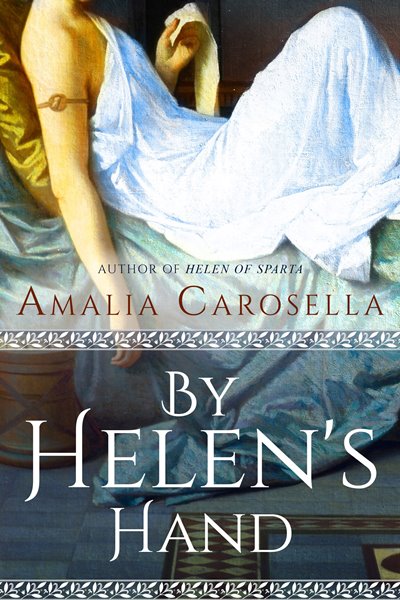Amalia Carosella: By Helen's Hand

Amalia and I are acquainted through Twitter and other social media. Last summer when I was recovering from gallbladder surgery, I read her Greek mythology debut, Helen of Sparta, and really liked it. She's as much as apologist for Theseus, it seems, as I am for Orestes.
The plot of Helen of Sparta is not the typical Helen story. Helen, of marriageable age, is put on display to attract various wealthy and powerful suitors. Her mother, Leda, has arranged with Agamemnon of Mycenae that Agamemnon's brother Menelaus will have Helen. But when Helen meets Theseus, king of Athens, she has eyes for no one else. Her nightmares predict that if she marries Menelaus, disaster will come in form of a terrible war. So she is a willing participant in her own abduction by Theseus.

The sequel, By Helen's Hand, picks up right where the first book left off. Theseus has followed his best friend Pirithous on a fool's errand to Hades, leaving Helen vulnerable and uncertain if he will ever return to save her from the man she dreads and the future marriage to Menelaus will bring about.
Helen is a very, very, very difficult character to get right. I know from experience. The very best Helen aside from Homer is, I think, that written by the late Colleen McCullough in Song of Troy. Amalia's Helen is unique in that she experiences prophetic nightmares--what notes she and Cassandra could have compared!--and regards Theseus as her savior and ally rather than as traumatic episode in her early life that underscores how inextricably linked sex and violence are in the story of Helen. Amalia's Helen does try to avert disaster with the means at her disposal, but the story lacks somewhat because as readers we all know the Trojan War is inevitable.
It is refreshing to see other characters in the mix: Odysseus, Patroclus, and Polypoetes, a lesser-known suitor of Helen who also happens to be the son of the rakish Pirithous.
What troubled me most was the depiction of Menelaus. As I mentioned above, Menelaus in Homer is not a bad guy. I know, I've written him. Yet he, like Helen, reflects current attitudes. Why would Helen leave her home and daughter, and everything she knows, to run off with Paris unless she's escaping an abusive marriage? Modern-day audiences aren't comfortable with the Olympian gods; they tend to see ancient ideas and mores in a Judeo-Christian light. So they miss the point of Aphrodite's involvement. She's the goddess of love and everything south of the waist, yes, but remember that her lover is the god of war. Sex and violence again. Helen's suitors compete for the right to wed and bed her; the ancients referred to the sheer physical intensity--and occasional brutality--of the marriage contest as agon, from which we get the modern word agony. Not for a moment do I believe that Menelaus would not have been there showing off his prowess and fitness to rule Sparta, even if he was a second-rate warrior whose big brother Agamemnon operated behind the scenes to orchestrate a political alliance between Sparta and Mycenae.
Helen did not leave Menelaus because he wasn't a decent husband or father to their daughter Hermione, but because she was stricken by the love-dart of Eros. Aphrodite pulls the strings.
Homer tells us that Helen tires of pretty-boy Paris and longs to return to Menelaus and home; he never says whether Helen regrets the savagery and loss of the Trojan War as keenly as Menelaus does. In The Odyssey, she's busy dispensing Egyptian-smack-in-a-bottle whenever her husband gets broody.
Amalia's ending is inspired, taking a rather obscure legend about Helen's time in Egypt and making it flesh, yet in some ways it feels like a deus ex machina. I liked By Helen's Hand with some reservations, but then, I am a notoriously nitpicky reader. I will leave readers to decide how well Amalia handles the issues surrounding the Trojan War.

By Helen's Hand (Helen of Sparta #2) by
Amalia Carosella
Publication Date: May 10,
2016
Lake Union Publishing
eBook & Paperback;
Genre: Historical Fiction

With divine beauty comes dangerous power.
Helen believed she could escape her destiny and save her people from utter
destruction. After defying her family and betraying her intended husband, she
found peace with her beloved Theseus, the king of Athens and son of Poseidon.
But peace did not last long. Cruelly separated from Theseus by the gods, and
uncertain whether he will live or die, Helen is forced to return to Sparta. In
order to avoid marriage to Menelaus, a powerful prince unhinged by desire, Helen
assembles an array of suitors to compete for her hand. As the men circle like
vultures, Helen dreams again of war and of a strange prince, meant to steal her
away. Every step she takes to protect herself and her people seems to bring
destruction nearer. Without Theseus s strength to support her, can Helen thwart
the gods and stop her nightmare from coming to pass?
Amazon (Kindle) | Amazon (Paperback) | Barnes & Noble | IndieBound

About the Author
Amalia Carosella graduated from the
University of North Dakota with a bachelors degree in Classical Studies and
English. An avid reader and former bookseller, she writes about old heroes and
older gods. She lives with her husband in upstate New York and dreams of the day
she will own goats (and maybe even a horse, too). For more information, visit
her blog at www.amaliacarosella.com. She also writes fantasy and
paranormal romance as Amalia Dillin.
You can also connect with Amalia on Facebook, Goodreads, and Twitter here and here.

By Helen's Hand